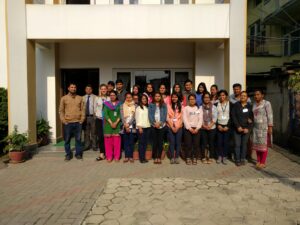The ARCH project recently marked an important research milestone in Nepal.
The project completed data collection for a critical study on young children’s consumption of snack foods (such as biscuits and candy) and sugar-sweetened beverages (like malt/chocolate-based drinks and juice drinks). The study aims to understand the role of unhealthy snacks and sugary drinks in children’s diets, and to assess associations with child growth and micronutrient status in the first two years of life – a time when adequate nutrition is crucial.
The first study of its kind in Nepal
In Nepal and around the world, there has been a substantial rise in consumption of such snacks and drinks among children, yet there is limited information on their role in the diets and nutrition of young children below 2 years of age. This study will contribute to filling gaps in knowledge by quantifying consumption of snack foods and sugar-sweetened beverages, and assessing if high consumption of unhealthy snacks among young children is associated with inadequate nutrient intakes, poor iron or vitamin A status, or inadequate growth.
These research findings will provide new information for policymakers and program managers working to improve child nutrition and health in Nepal and other low and middle income countries.
“This study will provide critical evidence to help protect child health and prevent malnutrition. With new data on the role of unhealthy snacks in children’s diets, we can develop evidence-based nutrition policies and programs that can help to ensure appropriate and nutritious diets for young children in Nepal.” –Alissa Pries, ARCH Snack Study Technical Advisor
A critical time for healthy eating
Consuming too many unhealthy snack foods and sugar-sweetened beverages can be particularly harmful to children under two. Between six months through two years of age—known as the complementary feeding period— it is critical for children to eat enough healthy foods to grow, develop, and thrive physically and mentally.
Unhealthy snacks and sugary beverages may take the place of healthy foods in a child’s diet, and also establish taste preferences that will carry on into adulthood —putting young children at risk not only of malnutrition, but potentially increasing their risk of developing obesity and chronic diseases later in life.
Measuring the link between unhealthy snack consumption and child nutritional status
To investigate the association between unhealthy snacks and sugar-sweetened beverages and children’s nutritional status, the research team visited over 18,000 households in Nepal’s Kathmandu Valley in order to identify eligible households and collect data on over 700 children 12-23 months of age and their primary caregivers, such as mothers, grandmothers or fathers. The study focuses on this age group because a 2014 ARCH study found that almost all children 12-23 months of age had consumed a commercially produced snack food in the previous day; however, the question remained of how much of these foods were consumed and what this meant for their overall diet.
The research team conducted interviews with the primary caregivers of 745 children aged 12-23 months. The caregivers were asked how often the child consumed snack foods and sugary beverages and information about the types and quantities of all foods consumed by the child in the last 24 hours was collected to be able to assess the child’s nutrient intake. The team recorded weight and height/length measurements for children and their mothers, and collected a sample of each child’s blood to measure hemoglobin and iron and vitamin A status.
The double-burden of malnutrition
Like many other countries undergoing economic transition, Nepal is currently experiencing a double-burden of malnutrition; the country faces high rates of undernutrition, while obesity is also a growing problem. An alarming one-third of Nepalese children under five years of age suffer from stunted growth because they do not receive adequate nutrition. At the same time, there has been an increase in obesity among adults in Nepal. Globally, we know that the rising consumption of unhealthy snack foods and sugar-sweetened beverages contributes to the problem because foods high in sugar and salt, and low in necessary micronutrients increase the risk of overweight and obesity.
ARCH will publish study findings
Once analysis is completed, ARCH plans to make these study findings widely available; publication is expected in 2019. Policymakers and program implementers in Nepal and other countries will be able to use this new information to guide policy related to snack foods and sugar-sweetened beverages, as well as programs aimed to improve children’s nutrition and health.



